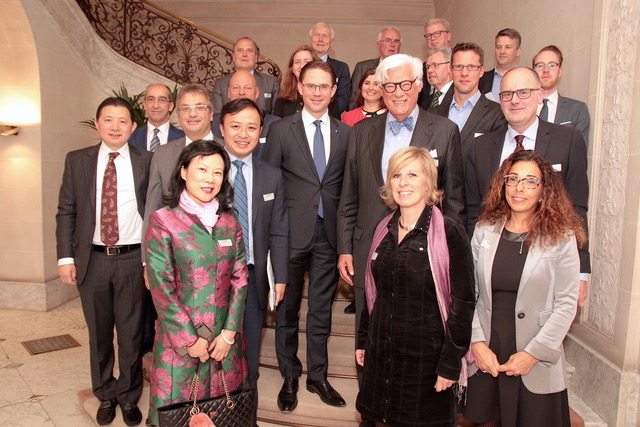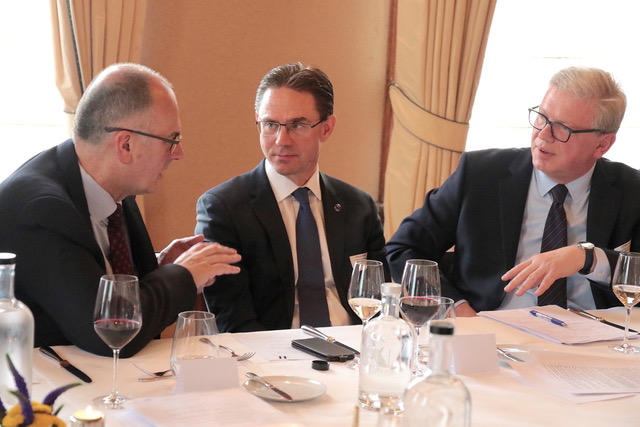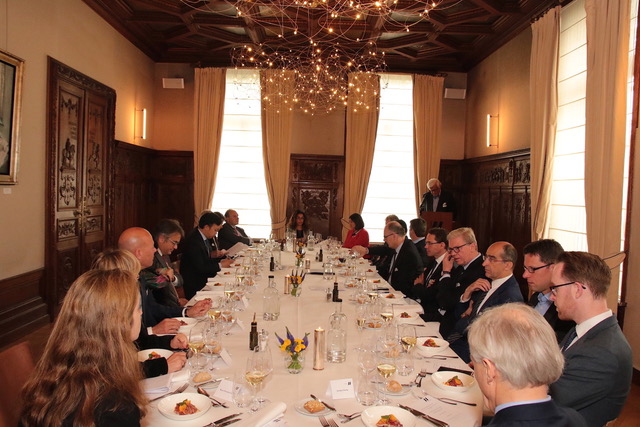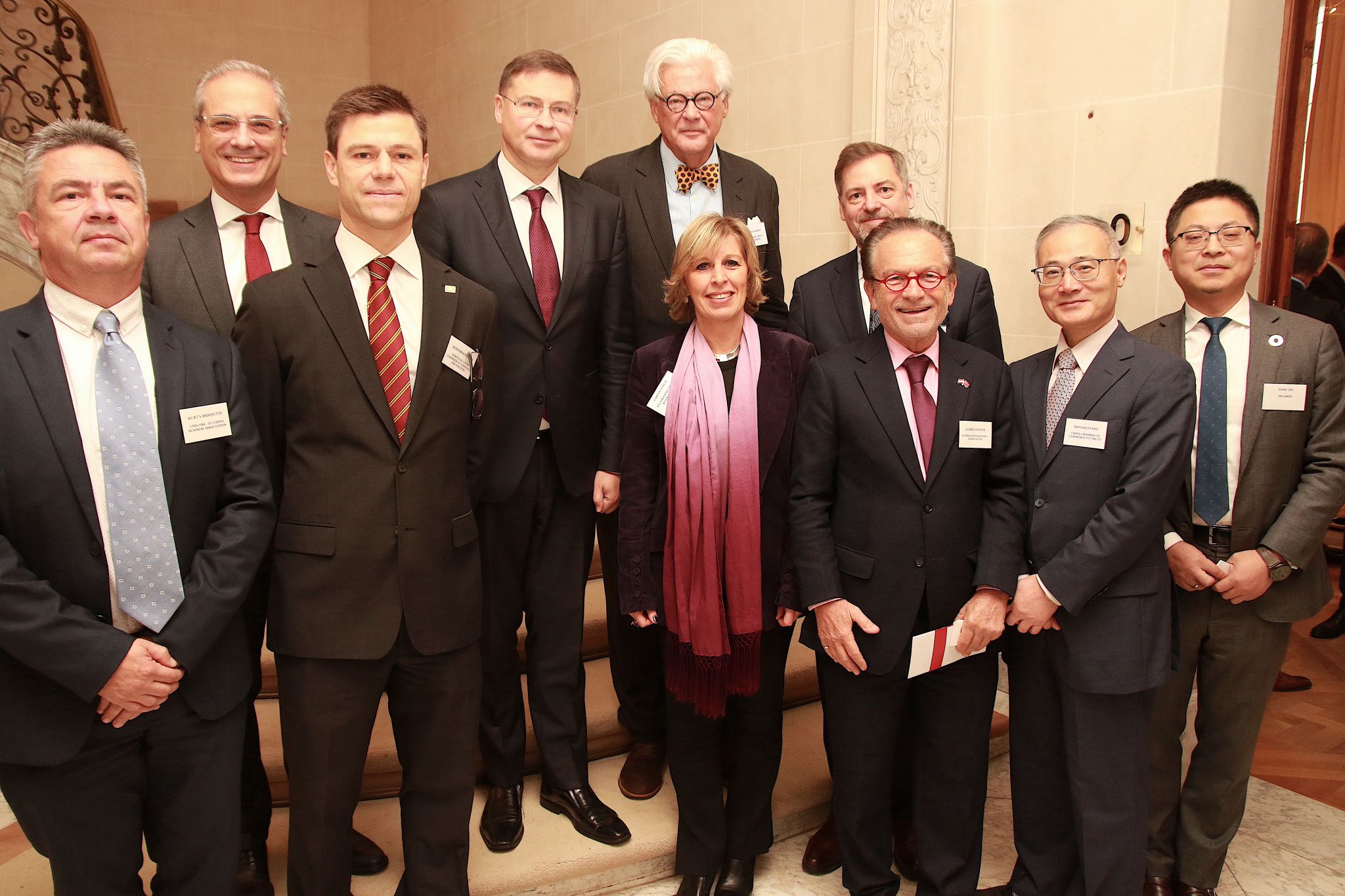with Mr Jyrki Katainen, Vice-President European Commission in Charge of Jobs, Growth, Investment and Competitiveness
De Warande, 6 May 2019



Speech by Vice-President Katainen
China is the EU’s second trade partner in the world, while the EU is China’s number one trade partner.
If we just look at our bilateral trade in goods, in 2018, China had a share of 11% of the EU’s exports, making it the second largest partner behind the United States (20 %). On imports, China was the largest partner with a share of 20%, ahead of the United States. In 2018, the EU trade deficit with China – in goods – reached EUR 185 billion. While we do not consider this trade deficit to be a problem in itself, we nevertheless have to acknowledge that it is also the result of an unbalanced relationship where China enjoys more favourable and open market access conditions in the EU than EU exporters and investors face in China. We need to rebalance our relations with China. I will revert to this in my speech today.
These figures are impressive, and speak of the size and the depth of our relationship.
But there is still enormous untapped potential for growth – in particular on services and investment. EU-China trade in services – while increasing – is only around one tenth of our trade in goods. And much of services trade – typically 40% – is delivered through investment.
At the same time, the “narrative” on China is rapidly changing in Europe. In the Commission Communication of 12 March 2019 on China, we have described China as a cooperation partner, a negotiation partner, a competitor and a rival. The qualification of “competitor” is a positive one in the EU, and businesses know it well; we like fair and open competition. Competition is healthy in sports, in business, makes us stronger and more competitive. Defining China as our competitor means that we must prepare ourselves and stay fit to deal with the challenges resulting from our different economic and political models, including lack of a level playing field with Chinese companies.
Now, as you know, we just had the EU-China Summit in Brussels on 9 April. The EU objective for this Summit was precisely to find ways to rebalance our relationship and to tap the untapped potential. We also know that the current international rules are not equipped to deal with the challenges posed by China’s state capitalism and market distorting practices.
After protracted discussions on the Summit Statement, and by taking a firm and united approach, we managed to get China commit to work on strengthening international rules on industrial subsidies, on more result-oriented work on market access and on a timeline to conclude the negotiations on investment and Geographical Indications.
What does this mean, in a nutshell?
As a real breakthrough, and for the first time, China agreed to specifically discuss the strengthening of international (i.e., WTO) rules on industrial subsidies.
The inclusion of industrials subsides in the joint statement was one of the most difficult issues during the negotiations, with the final agreement reached only in the very last minutes of the talks.
Another very important Summit commitment relates to the longstanding problems our companies face in terms of getting market access to China. Based on the Joint Statement, the work is set to intensify and accelerate here too: with a view to provide each other with broader and non-discriminatory market access, the EU and China will work towards finding mutually agreeable solutions to a number of key barriers. To make this commitment fully operational, a specific stocktaking is foreseen for the next EU-China Summit.
This commitment is particularly important, as contrary to the Chinese narrative of reform and opening up, EU businesses have been reporting an increase of new market access barriers in China, with 14 new obstacles listed in the EU Market Access Database in only the last two years that has affected directly € 32 billion in EU exports (15% of the total). China now maintains the highest number of identified market access barriers (37) among any all our partners.
We have also agreed on a timetable that should lead to the conclusion of the Investment Agreement negotiations in 2020, building on the decisive progress to be achieved still in 2019. Here progress will be overseen by a political monitoring mechanism.
Additionally, and based on the provisional agreement already reached between negotiators on the text of the future Geographical Indications (GIs) agreement and on the protection for the majority of GI names, there is a joint commitment in the statement to resolve the remaining issues (in particular outstanding GIs). The common, declared objective is to conclude these negotiations still in 2019.
Finally, there is also a joint agreement that there should be no forced transfer of technology. While this seems to be in line with the principles of the Chinese legislation currently in force (that is however not necessarily in line with the practice), having a joint declaration on this matter is an important political signal.
So all in all a promising outcome of the Summit. However, as they say, the proof of the pudding is in the eating.
In this regard, the follow-up actions and monitoring mechanism agreed as to market access and the investment negotiations are important achievements in their own right.
In order to ensure proper implementation, the EU will continue to engage with China through the relevant fora, including the High Level Economic Dialogue, the Trade and Investment Policy Dialogue or the working group on WTO reform.
We have already started working towards implementing these actions. It will not be easy, since China still resists the calls to truly reform, and at best moves in small incremental steps when it feels that this is inevitable.
We have repeatedly impressed upon China that not acting towards real change and reform would be short-sighted, and would eventually put at risk the very multilateral system which has worked to the benefit of all, but also, and foremost, to China’s benefit. We hope that, sooner rather than later, they will heed our call.
So much about our interaction with China.
On our side, we will at the same time continue to pursue other elements of our strategy towards China, outlined clearly in the Joint Communication adopted on 12 March and largely endorsed by the European Council on 22 March.
The Joint Communication proposed concrete actions to rebalance our relationship with China.
We want China to recognise its responsibilities and to act in a way commensurate to its size and power, so as to ensure a level playing field between trading partners.
But we also need to look at our own internal market rules which may need to be revamped or supplemented so that we are better equipped to deal with the challenges posed by China.
We are ramping up our efforts to implement the actions outlined in the Communication. Each of the 10 actions will require a coordinated effort within the Commission and with the Member States, with the support of the business community and civil society at large.
I would be very interested to hear your views, comments and suggestions on the Joint Communication, the 10 Actions proposed therein and on the way forward to implement them effectively.
As one of the very important steps, we are gearing up to resume the legislative work on the International Instrument on Procurement [Action 6]. I believe this is a good time to revive our proposal with a view to promoting reciprocal access to third country procurement markets and address imbalances such as in the case of China, whose procurement market is largely closed. We hope the Council and the Parliament will be willing to take a fresh look at the proposal, in light of the recent developments. I hope that you Association will be able to actively support this initiative.
Another important follow-up action of this Communication on China is that we are currently checking if we can do more to address foreign subsidies that may distort the EU internal market. We have indeed very stringent State Aid rules in the EU but they only apply to Member States subsidies. We must be able to apply a similar level of discipline to foreign subsidies.
Let me touch upon the topic of Euro-Asian connectivity. We want to work with China and our Asian partners to improve connections between Europe and Asia, while drawing on our values and approach. To this end, we have recently adopted the EU Connectivity Strategy for Asia.
The EU approach is to support transport, energy and digital connections between Europe and Asia, but only if this is done in a sustainable, cooperative, responsible, and rules-based manner. Infrastructure networks should be coherent, interoperable, as well as financially and environmentally sustainable. Calls for tender should be open and transparent to promote good governance and a level playing field. It is an approach that works, and one that we see a demand for among Asian countries, in our Eastern neighbourhood, the Western Balkans and beyond.
Better connectivity will create new opportunities for citizens and businesses and open new avenues for higher living standards, political dialogue and civil society ties. It is therefore in the interest of the two continents to become better connected, to the benefit of local populations and future generations. Europe and China have a global responsibility to cooperate to make this happen.
All Member States will always have their bilateral relations with China, as should be the case. At the same time, they all have common strategic interests vis-à-vis China. We must stay united. This also applies to the Belt and Road Initiative.
The European Union has demonstrated that, when it is united, it is able to achieve its objectives globally and with its partners.
To conclude, let me say that Europe and China’s global interdependence is growing. We have an opportunity for increased cooperation, to promote peace, shared prosperity, fair trade, a clean planet, and sustainable development.
Let’s seize this chance. Let’s not let nationalism, egoism, or short term views win. We can compete economically, and this is good if such competition is fair. At the same time, we can also work and cooperate together on the big challenges of our time.




